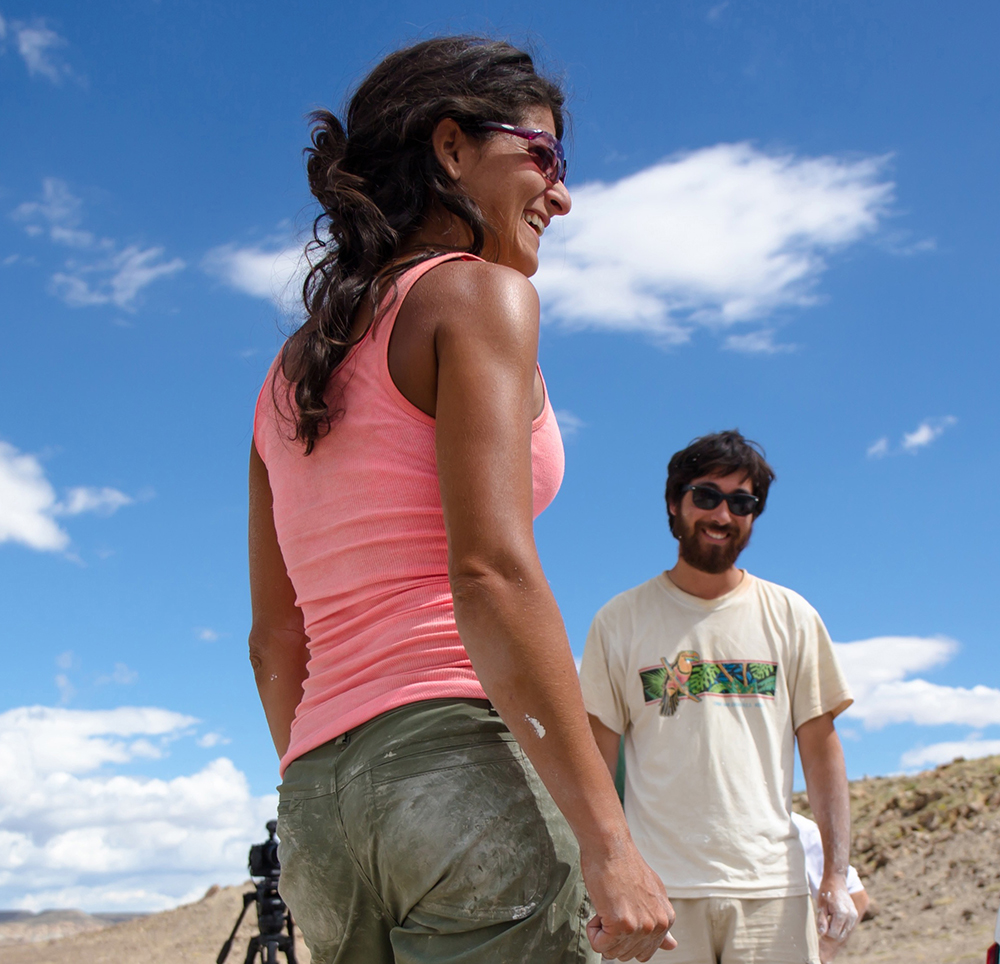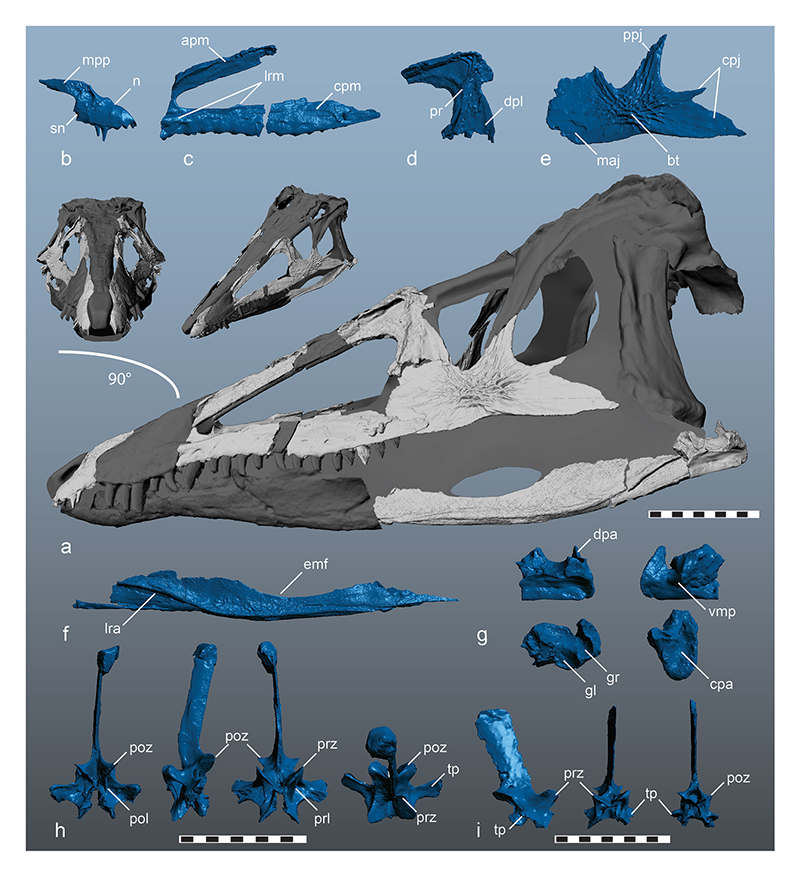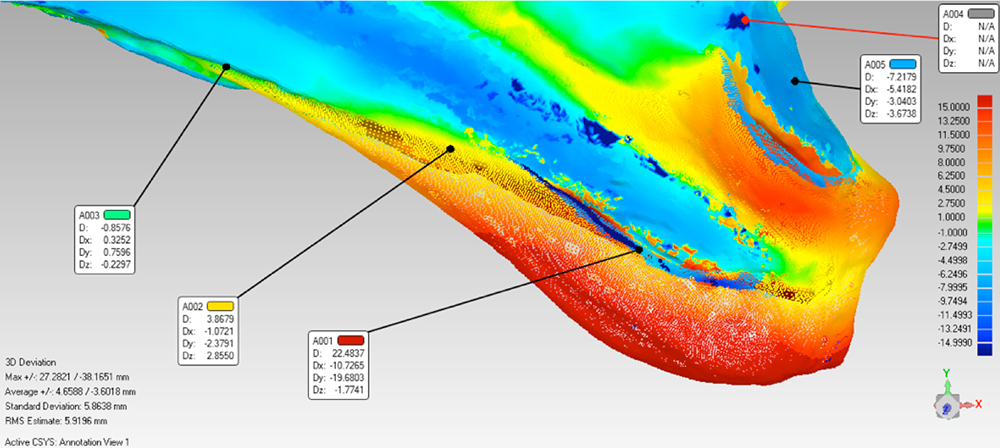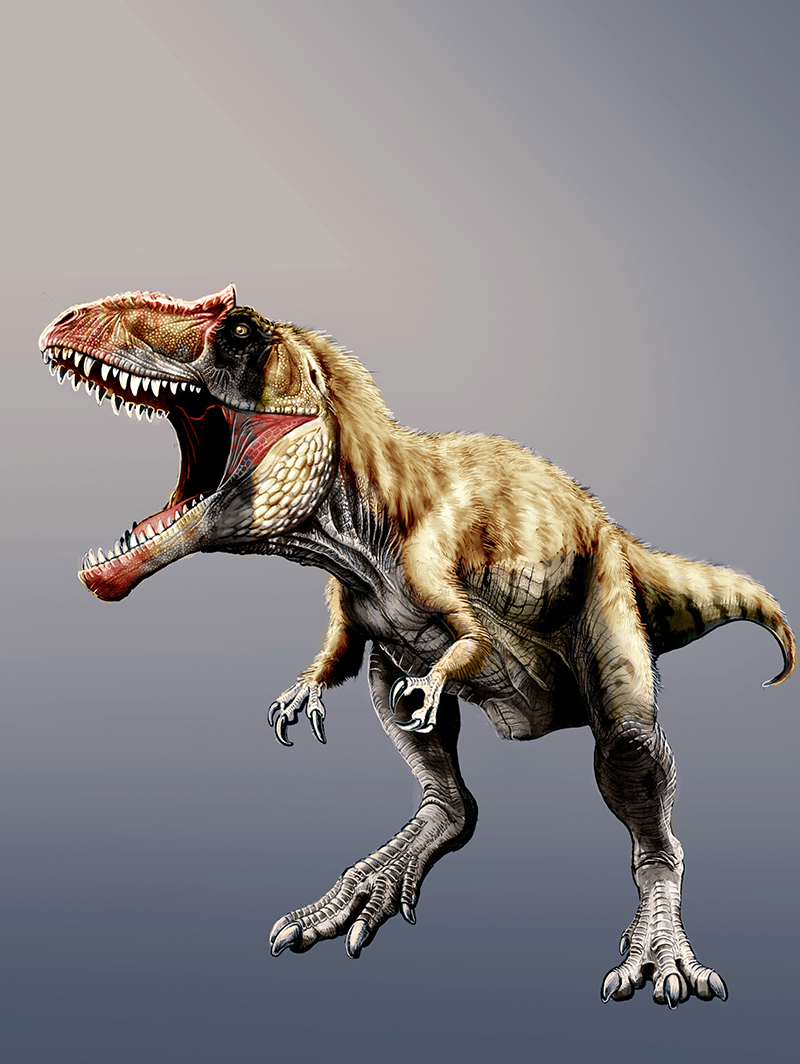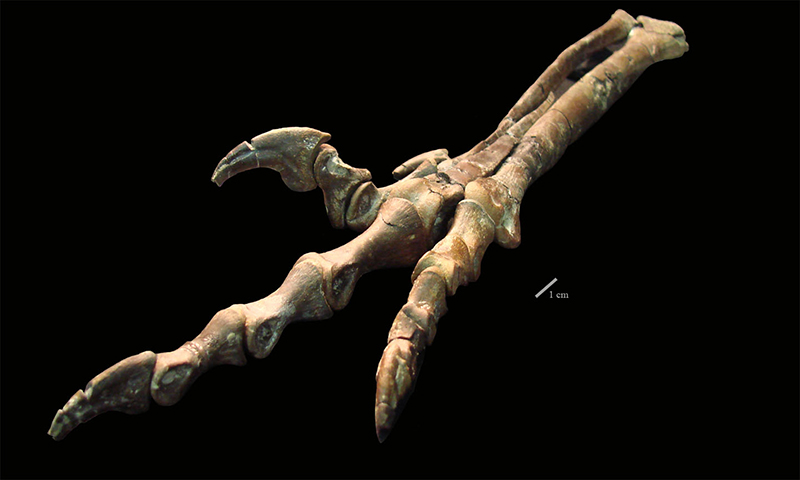Lindsay Zanno
Division Head, Paleontology
lindsay.zanno@naturalsciences.org
121 West Jones Street, Raleigh, NC 27601
Education
- Ph.D. in Geology, University of Utah, 2008
- M.S. in Geology, University of Utah, 2004
- B.S. in Biological Anthropology, University of New Mexico, 1999, summa cum laude
Appointments
- Associate Research Professor, Department of Biological Sciences, NC State University
- Research Associate, Vertebrate Paleontology, Sam Noble Museum
- Research Associate, Department of Geology, Field Museum of Natural History
- Research Associate, Paleontology, Natural History Museum of Utah
- Honorary Research Staff, Evolutionary Studies Institute, University of Witwatersrand
- Research Associate, Department of Marine, Earth, & Atmospheric Sciences, NC State University
- President, The Jurassic Foundation
Research Interests
- Anatomy, phylogeny, and paleobiology of theropod dinosaurs
- Paleoecology and paleobiogeography of Cretaceous terrestrial ecosystems
- Effects of climate change on vertebrate diversity, speciation, & extinction
- Comparative phylogenetic approaches to vertebrate evolution
Dr. Lindsay Zanno is Head of Paleontology at the NC Museum of Natural Sciences and an Associate Research Professor in the Department of Biological Sciences at North Carolina State University where she is part of the Paleobiology and Forensic Anthropology Research Group and Paleobiology Minor . At the museum she oversees the unit’s collective research and educational activities, three research collections (Paleobotany, Invertebrate Paleontology, and Vertebrate Paleontology), and directs the on-exhibit Paleontology Research Lab in the Nature Research Center building.
Zanno’s research interests and methods are broad. Her lab uses morphological data from extinct and living vertebrates to address evolutionary patterns on geologic timescales, with a focus on Mesozoic dinosaurs. Specifically, she is one of the world’s leading experts on evolution of theropod dinosaurs—a group that includes the iconic predator T. rex and Velociraptor, as well as living birds. The Zanno Lab works at all scales from detailed anatomical descriptions of newly discovered species to identifying broad macroevolutionary trends. Currently active projects can be organized into the following themes: the evolution of diet and dentition, sexual/social display structures and weaponry; comparative life history and growth; paleobiogeography; extinction/radiation; reproductive paleobiology; and alpha-taxonomy/systematics. The Zanno Lab’s methodological approaches encompass advanced visualization technology (laser surface scanning, computed tomography, photogrammetry, 3D printing), histology, phylogenetic comparative methods, and comparative anatomy.
An important component of Zanno’s research program is exploratory in nature. Her teams typically spend several months a year on expedition collecting fossils of dinosaurs and other Mesozoic vertebrates for scientific research. Goals of the field program are aimed at understanding how changing climate and environmental conditions affected life on land during the Cretaceous. Currently active field projects span the Asian and North American continents and include Mongolia, Thailand, multiple states across the American West from where she has discovered the remains of more than a dozen new species, including Siats , one of the largest meat-eating dinosaurs on the continent, and Moros , North America\'s tiniest tyrannosaur. You can follow along with Zanno Lab expeditions on the real-time social media platform— Expedition Live!.
Zanno’s research is regularly published in high-profile, general science journals including Nature, Nature Communications, PNAS, Proceedings of the Royal Society, B, and Scientific Reports, for which she was awarded top 100 author recognitions in 2016 & 2017. Her work has been recognized as Nature World News’ Top Dinosaur Stories, Discover Magazine’s top 100 Science Stories, and Discover Magazine’s Year in Science Top Research and has been featured by notables such as the Science Channel, History Channel, National Geographic, CBC, PBS, NPR, NHK, Nova, and the BBC, among others. She was recently featured as Science Advocate for the Walking With Dinosaurs Arena Spectacular, on-air host for The Ice Age Exhibition, and currently serves as President of The Jurassic Foundation, a non-profit, grant funding organization supporting dinosaur research. She also coordinates several citizen science and STEM education projects including FossilPhiles, a teen citizen science effort to digitize fossils and Shark Tooth Forensics, with Dr. Terry Gates.
Zanno’s published impact includes 170 technical works and to date, her lab has received over $6M in direct funding for research and education.
Donate
Want to support the Paleontology Research Lab? Donate to the Paleontology Research & Expedition Fund. Gifts to this fund directly support paleontological fieldwork and research at the North Carolina Museum of Natural Sciences
Selected Publications
- Canoville A, Schweitzer M, Zanno LE. 2020. Identifying medullary bone in extinct avemetatarsalians: challenges, implications, and perspectives. Philosophical Transactions B 375: 20190133. doi.org/10.1098/rstb.2019.0133
- Zanno LE, Gates TA, Canoville A ,Tucker RT, Avrahami H, Makovicky PJ. 2019. Diminutive, fleet-footed tyrannosauroid narrows the 70-million-year gap in the fossil record of North American “tyrants.” Communications Biology 2: 64 (2019). DOI https://doi.org/10.1038/s42003-019-0308-7
- Button D, Zanno LE. 2019. Biomechanical analysis of the feeding apparatus reveals repeated convergent evolution between herbivorous dinosaurs. Current Biology 30:1–11 https://doi.org/10.1016/j.cub.2019.10.050
- Arbour V, Zanno LE. 2018. The Evolution of Tail Weaponization in Amniotes. Proc R Soc B. Published 17 January 2018.DOI: 10.1098/rspb.2017.2299
- Gates TA, Organ C, Zanno LE. 2016. Ornamentation and the rapid evolution of gigantic theropod dinosaurs. Nature Comm. 7:12931 doi:10.1038/ncomms12931
- Zanno LE, Drymala S, Nesbitt SJ, Schneider V. (2015) Early crocodylomorph increases top predator diversity during rise of dinosaurs. Scientific Reports 5:9276 doi:10.1038/srep09276.
- Zanno LE, Makovicky PJ. 2013 Neovenatorid theropods are apex predators in the Late Cretaceous of North America. Nature Communications. 4: 2827. doi:10.1038/ncomms3827.
- Zanno LE, Makovicky PJ. 2012. No evidence for directional evolution of body mass in herbivorous theropod dinosaurs. Proc R Soc B. 2013 280 1751 20122526; doi:10.1098/rspb.2012.2526 (published 28 November 2012) 1471-2954.
- Zanno LE, Makovicky PJ. 2011 Herbivorous ecomorphology and specialization patterns in theropod dinosaur evolution. Proceedings of the National Academy of Sciences USA 108:232–237; doi:10.1073/pnas.1011924108.
- Zanno LE, Varricchio DJ, O’Connor PM, Titus AL, Knell MJ. 2011. A new troodontid theropod, Talos sampsoni gen. et sp. nov., from the Upper Cretaceous Western Interior Basin of North America. PLOS ONE 6(9): e24487. doi:10.1371/journal.pone.0024487
ONLINE PUBLICATIONS AND RESOURCES
- President, The Jurassic Foundation, a non-profit, grant awarding organization supporting paleontological research.
- Program Committee Co-chair, The Society of Vertebrate Paleontology
- Executive Committee Member, Academy of Outstanding Faculty in Extension and Engagement
- Editor, The Journal of Vertebrate Paleontology
- Science Advocate and media liaison, Walking With Dinosaurs, Arena Spectacular
Public Science Projects:
- FossilPhiles is an NSF funded citizen science effort that introduces underserved middle and high school students to advanced visualization and digital data archiving of paleontological specimens for public use. The project launched in 2016 and has received an additional year of funding for 2023. You can view the NCMNS’ 3D database of fossils through the FossilPhiles website.
- 2016 – 2019 National Science Foundation, Collections in Support of Biological Research: Natural History Collections (CSBR, award #1560871): Critical Conservation of Paleontological Collections at the NCSM: A Platform to Engage Underserved Students in Citizen Science. ($495,280 to PI LE Zanno; w/Co-PIs L Herzog, P Weaver, V Schneider)
- 2019 – 2024 National Science Foundation, Frontier Research in Earth Science (DES, FRES, award # 1925973): Collaborative Research: Time of Transformation: integrating the dynamic geologic, climatic, and biotic systems of North America during the Early to Late Cretaceous transition: ($654,347 to PI LE Zanno and Co-PI E Hyland; total award $2,499,950 w/PIs C Suarez, R Cifelli, M Suarez, P Makovicky)
- In Shark Tooth Forensics students contribute data to understand the ecology and evolution of ancient sharks. It was developed by Zanno, NC State University faculty Terry Gates (lead scientist) and Rob Dunn, and funded by two awards and one private gift to date:
- 2013–2018 National Science Foundation Math & Science Partnerships: Students Discover: Improving Middle School STEM Outcomes through Scaling Citizen Science Projects ($257,750 to SP: LE Zanno; total award $7,764,481 w/PI R Dunn), a 2015 Challenge Grant, College of Sciences, NC State University: Paths in the Park ($10,000 to Co-PIs: LE Zanno, TA Gates, J Painter), and a gift from BASF ($2,000 to LE Zanno and TA Gates).
- The Complete Dinosaur 3rd edition, a crowd-sourced book on dinosaur paleontology for public audiences.
Public Science Projects
- Dinosaur Cold Case, Omnifilm, for Smithsonian, US and CBC, Canada
- T. rex Timeline, Curiosity Stream
- Rise of Mammals, HHMI Tangled Bank Studios, for Nova
- Tyrannosaurus: The Feathered Tyrant, NHK, Japan
- Planet Dinosaur, BBC
- Waking the T-Rex 3D: The Story of Sue, Giant Screen Films
- Prehistoric Monsters Revealed, The History Channel
- Utah’s Dinosaur Graveyard, The Science Channel
Selected STEM Videos
- “Moros intrepidus: North America’s Tiny Tyrannosaur” Adrian Smith, NC Museum of Natural Sciences
- “A Dino Egg Airlift” NC State University
- “Rare dinosaur egg nest, discovered by Museum paleontologist” NC Museum of Natural Sciences
- “Digging into the World of Dinosaurs” faculty feature, NC State University
- “Paleontology 101: The Utah Expedition” NC Museum of Natural Sciences
- “Discovering and understanding a new type of dinosaur” UNC-TV Science
- “Ask Dr. Z! How many feathers did Acrocanthosaurus have?” Walking with Dinosaurs
- “Siats-The New Mega-predatory Dinosaur” Untamed Science
- “NC State Researchers Discover a New Dinosaur Species” NC State University
- “Paleontology 101” Untamed Science.
Archived Live Press Events
- “Press Event Announcing the Dinosaur Moros intrepidus” NC Museum of Natural Sciences
- “What’s Hatching at The Museum?” NC Museum of Natural Sciences
- “Press Event Announcing the Dinosaur Siats meekerorum” NC Museum of Natural Sciences
For more information about Zanno Lab research and the paleobiology graduate program at NC State University visit at the Zanno Lab website.
Follow along with the Zanno Lab’s fieldwork live on our real-time social media platform, Expedition Live! www.expeditionlive.org or on Twitter @Expeditionlive.


